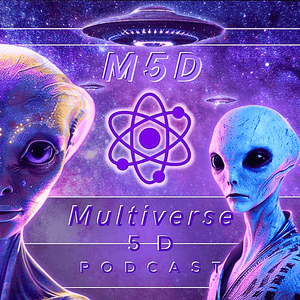2638 afleveringen

Exopolitics Today with Michael Salla - JP Taken To Witness Ancient Mars Evacuation ~ JP Update #43
30-10-2025 | 39 Min.
Exopolitics Today with Michael Salla - JP Taken To Witness Ancient Mars Evacuation ~ JP Update #43

It’s ALL a SETUP… Channeling St Germain REVEALS the LIGHT FLASH Coming in 2025 - Geoffrey Hoppe
30-10-2025 | 1 u. 52 Min.
It's ALL a SETUP… Channeling St Germain REVEALS the LIGHT FLASH Coming in 2025 - Geoffrey Hoppe

Discover the 5 Universal Laws That Shape Your Life and 11 Paths to Joy - Bashar (Darryl Anka) 2025
29-10-2025 | 39 Min.
Discover the 5 Universal Laws That Shape Your Life and 11 Paths to Joy - Bashar (Darryl Anka) 2025----more---- **🌌 Episode Description: Discover the 5 Universal Laws That Shape Your Life and 11 Paths to Joy – Bashar (Darryl Anka) 2025** Prepare for a profound journey toward self-knowledge and expanded consciousness with the teachings of Bashar, channeled by Darryl Anka. In this special episode, we explore the 5 Universal Laws that govern all existence and the 11 Paths to Joy, revealing how you can transform your reality with clarity, purpose, and vibrational alignment. ----more---- 🎙️ **What you'll discover in this episode:** - The 5 Universal Laws that shape your life and never change - How to apply these laws to create a more conscious and abundant reality - Bashar's 11 Paths to Joy: practical tools to raise your frequency - The importance of authenticity, passion, and synchronicity as inner guides - Reflections on the role of consciousness in the co-creation of the human experience ✨ Bashar reminds us that *reality is a mirror of your vibration*. By understanding and living by these laws, you become the architect of your own journey, accessing higher levels of joy, freedom, and expansion.----more---- Bashar 2025, Darryl Anka, universal laws, paths to joy, spiritual awakening, quantum physics and consciousness, Bashar channeling, personal transformation, vibrational elevation, practical spirituality, multidimensionality ----more---- 🎧 **Ideal for those seeking:** - Tools to live with more purpose and joy - Deep understanding of spiritual and universal laws - Inspiration to transform limiting beliefs and expand consciousness 📌 **Follow the podcast for more episodes on cosmic wisdom, channeling, and the power of consciousness in creating reality.**----more---- M5D Podcast - Daily UFO Updates Listen now on Spotify http://sptfy.bio/m5d #M5DPodbean, #M5DSpotify, #M5DAmazon, #M5DApplePodcast, #M5DListenNotes, #M5DPodchaser, #M5DBoomPlay, #M5DPlayFM, #M5DiHeart Radio

How To Employ The Law Of Attraction To Get What You Want In Life In 2023 - Bob Proctor
27-10-2025 | 45 Min.
🎧 Podcast Episode Description How To Employ The Law Of Attraction To Get What You Want In Life In 2026 - Bob Proctor----more---- Stop merely wishing and start attracting! The mentor Bob Proctor reveals the practical application of the Law of Attraction for you to manifest real results of success, wealth, and purpose in the year 2026. ----more---- It’s time to stop thinking about what you want and start ATTRACTING who you are. In this transformative episode, we dive into the core of Bob Proctor’s teachings on how to employ the Law of Attraction to define and achieve your most ambitious goals in the next cycle, 2026. Bob Proctor, the mind behind The Secret movement, always taught that the Law of Attraction is the Secondary Law, governed by the Law of Vibration. If you’ve been trying to manifest your dreams without success, you are skipping the most critical step: changing your Paradigm.----more---- In this episode, you will learn: The Single Truth: Why you attract who you ARE, and not just what you want. The Forgotten Secret: What your "paradigm" is and the exact steps to reprogram it and move away from "scarcity consciousness." Vibrating Action: How to use gratitude, visualization, and purposeful action to raise your frequency and tune in to wealth and success. 2026 Blueprint: Bob Proctor’s clear strategies to begin with the end in mind (define the realization) and manifest the life you were born to live.----more---- If you are ready to turn your thoughts into things and make 2026 your most abundant year, this is the definitive guide you have been waiting for. Click play and discover how success moves towards you!----more---- bob proctor, law of attraction, law of vibration, manifestation, personal development, the secret, success mindset, paradigm shift, wealth, success 2026, motivation #m5dsptfy #m5dbethefirsttoknow #m5dpodbean #m5dp #m5dpodcast #multiverse5dspotify #multiverse5dpodcast #multiverse5d #m5dspotify #podcastspotify #m5depisodes #m5dufopodcast #m5depisodes #m5dtruedarkfiles #m5dufofiles#ufo #deepstate #ufodisclosure #secretmission #ufology #ufoconspiracy #ufowhistleblower #darkfleet #spaceforce #spacedebris #uforevelation

SEXO E ESPIRITUALIDADE⚠️ SEXO ATRAPALHA - Exu Marabô - #espiritualidade #verdade #sexualidade
27-10-2025 | 43 Min.
SEXO E ESPIRITUALIDADE⚠️ SEXO ATRAPALHA - Exu Marabô - #espiritualidade #verdade #sexualidade - Entidades da Umbanda
Meer Religie en spiritualiteit podcasts
Trending Religie en spiritualiteit -podcasts
Over Multiverse 5D @ M5D
Luister naar Multiverse 5D @ M5D, KUKURU en vele andere podcasts van over de hele wereld met de radio.net-app

Ontvang de gratis radio.net app
- Zenders en podcasts om te bookmarken
- Streamen via Wi-Fi of Bluetooth
- Ondersteunt Carplay & Android Auto
- Veel andere app-functies
Ontvang de gratis radio.net app
- Zenders en podcasts om te bookmarken
- Streamen via Wi-Fi of Bluetooth
- Ondersteunt Carplay & Android Auto
- Veel andere app-functies


Multiverse 5D @ M5D
download de app,
luisteren.







































